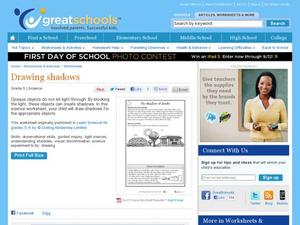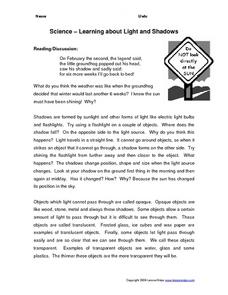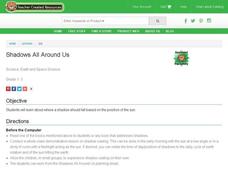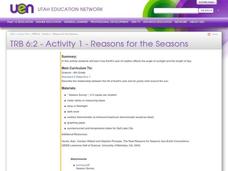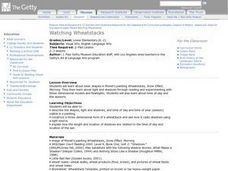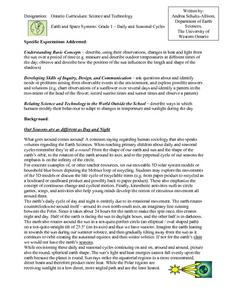Curated OER
No Shadow of Doubt
Fifth graders must use a pencil to draw in the shadows they think will be formed by a house, a greenhouse, and a tree. The sun is behind each of these objects, and an open field is in front of them. That's where pupils draw their...
Curated OER
Being Shadowed
What causes a shadow to appear? Have kindergartners and first graders explore shadows with a fun science activity. After reading a short paragraph about light sources, they draw a shadow for a little girl based on the location of the...
Star Date
Shadow Play
Three activities make up a solar system lesson that features the sun, its light, and the shadows it produces. Scholars step outside to discover the changes shadows make at different times of day, take part in a demonstration of how Earth...
North American Montessori Center
Sun and Moon Autumnal Equinox Activities
Two hands-on activities celebrate the sun and moon autumnal equinox. First, scholars create a cairn using a shoebox, flashlight, and drawing tools to view the sun's progression. Second, learners take to the kitchen to bake mooncakes and...
Curated OER
Science--Learning About Light and Shadows
In this light and shadows worksheet, students find 5 transparent items and 5 opaque items from the classroom and categorize them underneath their appropriate headings. Students look at 4 boxes with shadows and draw a little sun to show...
Curated OER
Shadows All Around Us
Students create shadows. In this shadow casting lesson plan, students read books about shadows, view a demonstration on shadow casting and then practice shadow casting on their own. Students cast a shadow using the position of the sun.
Curated OER
Earth, Sun and Moon
Students investigate that the sun is at the center of the solar system through role play. One student is the sun and one student is the Earth. The students then show how the Earth orbits around the sun. Students view a flashlight and...
Curated OER
Reasons for the Seasons
This worksheet requires the pupils to follow a teacher activity, so more-than-the-usual preparation for a practical is needed. Looking at a globe as it rotates and receives "sunlight" from a flashlight, pupils are able to observe the...
Curated OER
Labs from Chicago, Summer 1993: Calibrating the Sun's Light
Students experiment with the luminosity of the Sun's light. In this luminosity lesson, students participate in an experiment with luminosity of the sun and flashlights. They make filters and fiber optic sources.
Curated OER
Using a Sundial
Students examine the use of a sundial to tell apparent time. In this sundial instructional activity, students watch a teacher demonstration using a flashlight to create shadows. They discuss what happens to shadows of different objects...
Curated OER
Moon Shadows
Students study the moon and its shadows. In this moon lesson students complete a lab activity that shows the different shadows and answer questions.
Curated OER
The Shadow Knows
Sixth graders examine the relationship between light and the angle it strikes objects. In groups, they shine light from a flashlight on different objects and describe how it affects the shadow. To end the lesson, they complete a...
Illustrative Mathematics
Tilt of Earth's Axis and the Four Seasons
Geometry meets earth science as high schoolers investigate the cause and features of the four seasons. The effects of Earth's axis tilt features prominently, along with both the rotation of the earth about the axis and its orbit about...
Curated OER
Moon Shadows
For this moon shadows worksheet, 3rd graders follow the directions to set up a demonstration about the sun, the earth and the moon.
Curated OER
Day And Night
First graders examine how the earth experiences day and night by using a flashlight and a globe as a model.
Curated OER
Earth is Round?
Third graders discuss how Aristotle concluded that the Earth was round. As a class, they review theories about the Earth's shape and describe how life on Earth would be different if it were flat. Individually, they make a moon book in...
Curated OER
How Does Light Travel?
Sixth graders are read The Way to Start a Day by Byrd Baylor or Bear Shadow by Frank Asch. They discuss how the sun affects their daily life, 6th graders are encouraged to think about the light we recieve from the sun and how man has...
Curated OER
Reasons for the Seasons
Sixth graders conduct and analyze a survey that explores public perceptions about the reasons for seasonal change. They measure the changing length of days, observe shadows and discuss how the Earth's axis of rotation affects the seasons.
Curated OER
Watching Wheatstacks
Young scholars explore basic shapes in Monet's paintings Wheatstacks, Snow Effect and Morning. They study about light and shadows through reading and experimenting with three-dimensional models and flashlights.
Curated OER
Lunar Lollipops
Demonstrate the lunar cycle to youngsters using flashlights and lollipops. The procedure is somewhat vague, so it will need to be modeled for them before turning them loose to try it. The questions that follow the activity are not...
Curated OER
Earth's Seasons
Sixth graders review the relationship between the Sun and the Earth. In groups, they use a globe and flashlights to show the shadows on the Earth during the different seasons. To end the instructional activity, they write in their...
Curated OER
Moon Observations
Third graders create a model of the moon and use a flashlight to illustrate the various stages of the moon.
Curated OER
Starring...Bears!
Students illustrate a First Nations' legend. In this legend of bears instructional activity, students read several legends which involve bears and groups of stars or constellations. After reading, students illustrate portions of the...
Curated OER
Science: Daily and Seasonal Cycles
First graders use their observations to describe daily and seasonal cycles. through a demonstration using a suspended ball and flashlight, they determine the time of day in various locations. Next, 1st graders participate in a...


